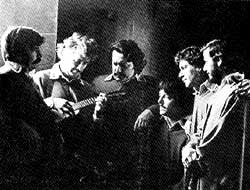|
PART
II
This is the second installment of Joanne Pottlitzer's
oral history documentation, based on several of her
interviews with Chilean songwriters and musicians. During
the dictatorship, music became an essential form of
communication, a sign of identity, a force for mobilization.
Artists, and musicians in particular, helped lay the
groundwork for later strategies that put an end to military
rule.
JAIME
SOTO LEON, composer, musician, founder of Barroco Andino

Inti-Illimani
Photo Copyright © Música Popular
Chilena –
20 Años 1970-1990 Edited by Alvaro Godoy
and Juan Pablo González |
Most
of the music during the time of Allende was associated
with his Popular Unity government, even the instruments:
the charango, the quena, everything. Even
a folk tune, or an instrumental piece, played on those
instruments was considered associated. A book by Yehudi
Menuhin [The Music of Man] mentions it in one
of the chapters: "If there was ever any doubt about
how important music can be for a country, look at what
happened in a country in the southern part of South
America, where music was banned because of the ideological
meaning it could have. Music becomes dangerous…"
I wondered how we could get around officialdom without
being branded as Communists or Socialists. And I thought
about my old friends Bach, Vivaldi, Handel. It would
be unthinkable for the military to censor a concert
of those composers, even if we played their music on
charangos and quenas. At the time, those
instruments were not heard on the radio or in concerts,
nothing.
We called ourselves Barroco Andino from the very first.
The name was the idea of one of our members, Renato
Freyggang, who went on to play with the Inti-Illimani.
We began by giving concerts in churches. Our first rehearsals
were in December 1973. Our first performance was the
following February in the Dominican church of La Serena
[a colonial town about 200 miles north of Santiago].
We were very lucky. For nearly two years we were practically
the only group heard in Chile. I remember once a colonel
called a meeting of all the folk musicians in Santiago
and told them to be careful, not to make waves, and
that the Barroco Andino was an exception. They couldn’t
suppress us. We were doing concerts in parishes, in
churches, and we filled them. Some people may have attended
them as a kind of political meeting, a place of meeting,
but as far as we were concerned, we were making music.
We said nothing related to anything political. If there
was any revolutionary attitude we showed as musicians,
I think it was the fact that we were there; we were
performing; we were playing instruments associated with
the Popular Unity and making that music ours. Music
that was "new" had not been heard by many
people. And in some way Barroco Andino prolonged the
New Chilean Song in Chile.
|
|


